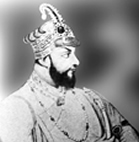Mir Jafar Ali Khan
Mir Jafar Ali Khan Nawab of Bengal from 1757 to 1760 and again from 1763 to1765. Mir Jafar (full name Mir Jafar Ali Khan) was an Arab by descent and son of Sayyed Ahmad Najafi. He came to India as a penniless adventurer like his master Nawab alivardi khan, who gave him the hand of his half-sister (Shah Khanam) and raised him to the post of Bakhshi, a position next only to the nawab himself.
Jafar Ali had gained a reputation for valour by his rapid march to rescue shawkat jang near Katak before his defeated and fleeing captors could murder him (1741) and later by a victory over the Marathas on 14 December 1746. But he proved his cowardliness when in February 1747 he was ordered to make a stand against the Marathas at Medenipur; he fled to Burdwan on hearing of the advance of the Maratha forces under Bhonsle, and abandoned Medenipur to the Maratha ravagers. Soon afterwards he entered into a conspiracy with Ataullah (the faujdar of Rajmahal) to overthrow Alivardi. The conspiracy was unearthed and he was dismissed along with his fellow conspirator.
But Mir Jafar’s designs did not stop there. Nawab sirajuddaula came to the throne in a house divided against itself and hostile factionalism grew in the army due to several factors including Mir Jafar’s ambition. Soon after Alivardi’s death Mir Jafar sent a secret letter to Purnia urging Shawkat Jang to invade Bengal, assuring him of his own support as well as the support of other disgruntled elements in the army and the court of Murshidabad. His unbridled ambition drove him to make a plan for the ouster of Sirajuddaula. With that aim in view he started intrigues at the Delhi Imperial Court for a farman granting Shawkat Jang the three eastern subahs.

But he failed. Siraj reshuffled appointments, placing his own partisans in important posts. Mir Jafar was replaced by Mir Madan as the bakhshi. When the English decided to overthrow Sirajuddaula after the recapture of Calcutta, a conspiracy to oust Sirajuddaula developed' with the help of the English in Calcutta. jagat sheth; Rai Durlabh, the former diwan, and Mir Jafar had joined hands with the English to overthrow the nawab. Towards the end of April 1757 the English got promises of cooperation from these conspirators, and on 1 May 1757 the Calcutta Council agreed to a secret treaty with Mir Jafar, promising to place him on the throne on certain conditions. william watts, the chief of the English factory at kasimbazar, conducted and completed the conspiracy with remarkable diplomatic skill, secrecy and courage. On 5 June 1757 he visited Mir Jafar and obtained his oath of allegiance.
In the battle of palashi, on receiving the news of Mir Madan's fall, Sirajuddula called Mir Jafar to his tent and begged his loyalty. Mir Jafar swore by the Holy Quran to fight the English; advised the nawab to withdraw the troops from the field and promised to fight with renewed vigour next morning. On coming out of the nawab's tent to his own troops in the field, he sent a letter to robert clive informing him of the nawab's helplessness and despair and urging the English to advance at once and seize the camp.
Mir Jafar's treacherous advice worked. The nawab suspended the engagement of his troops for the day and ordered the withdrawal. When the nawab's troops began to withdraw Clive launched an assault upon the retiring troops. The vast cavalry hordes of Mir Jafar, Durlabh Ram and Yar Latif were retiring further and further away without having fired a single shot during the whole day, while Clive's musketeers kept up a steady volley. Clive himself sprang forward to deliver the decisive blow. The nawab's army fled in confusion. The nawab himself was forced to flee, but soon after he was captured and put to death by one Muhammadi Beg under orders from Mir Jafar's son, Miran. On 29 June Clive met Mir Jafar at Sirajuddaula's Hirajhil Palace and there, in the presence of the great zamindars and other courtiers, he led Mir Jafar by the hand to the masnad, and saluted him as the nawab of Bengal, Bihar and Orissa, upon which the courtiers congratulated him and paid him the usual homage.
As a reward the company was granted undisputed right to free trade in Bengal, Bihar and Orissa. It also received the zamindari of the 24 Parganas near Calcutta. Mir Jafar paid a sum of Rs. 17,700,000 as compensation to the company for Sirajuddaula's attack on Calcutta and the traders of the city. In addition, he paid large sums as 'gifts' to high officials of the company. Moreover, it was understood that British merchants and officials would no longer be asked to pay any taxes on their private trade. The company's officials wished to grasp all they could by using Mir Jafar as a 'golden sack' into which they could dip their hands at pleasure.
Mir Jafar soon discovered that it was impossible to meet all the demands of the company and its officials, who on their part, began to criticise the nawab for his incapacity in fulfilling their expectations. Therefore, in October 1760, the company forced Mir Jafar to abdicate in favour of his son-in-law, mir qasim. But soon the independent spirit of Mir Qasim led to his overthrow and the English restored Mir Jafar as nawab in 1763 and collected huge sums for the company and its high officials. Mir Jafar's inglorious nawabship ended with his death in 1765. [Mohammad Shah]
Bibliography AC Roy, The Career of Mir Jafar Khan, 1757-66, Calcutta, 1953; KK Datta, Alivardi and His Ttimes, Calcutta, 1963; Bipan Chandra, Modern India, New Delhi, 1976; JN Sarkar, History of Bengal, (Muslim Period), 1200-1757, New Delhi, 1977.
